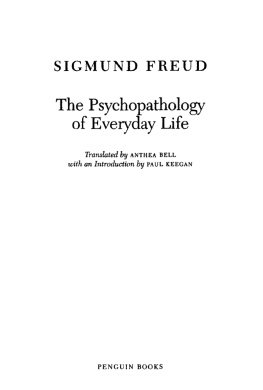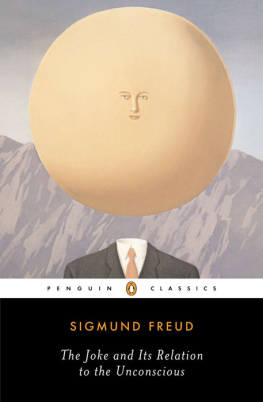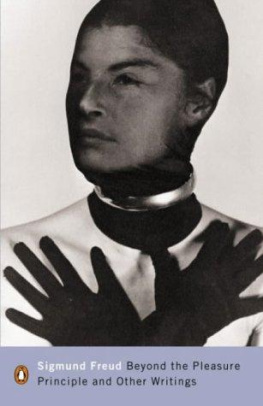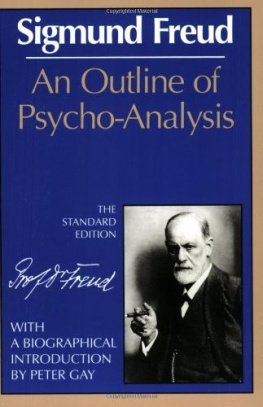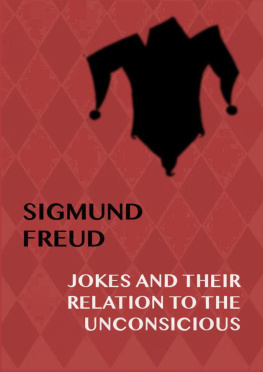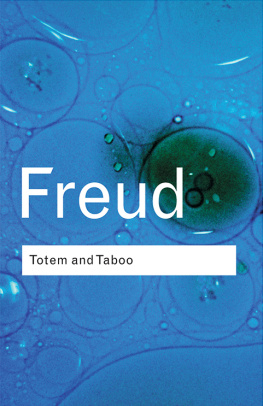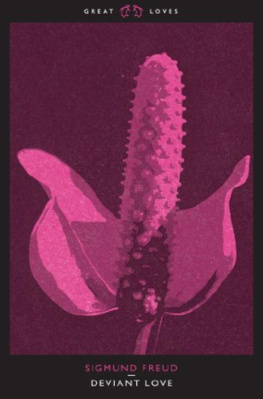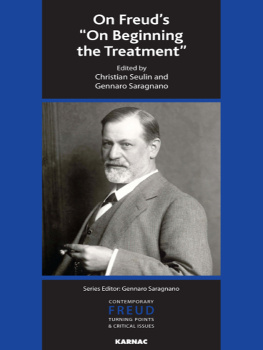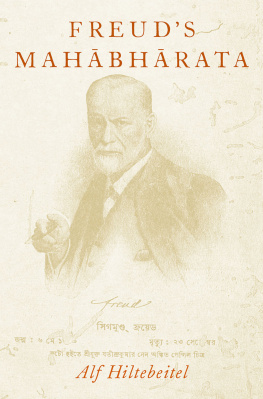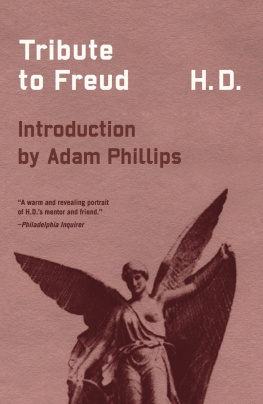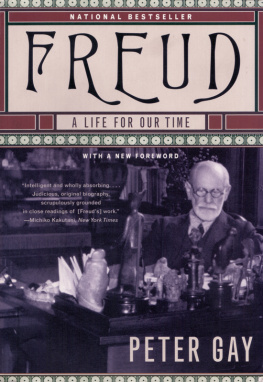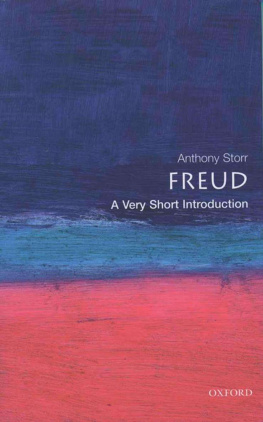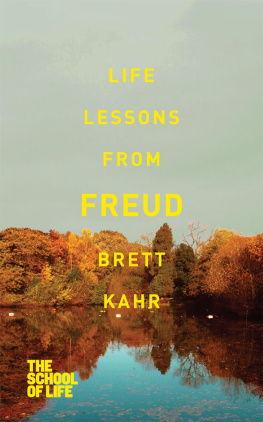Sigmund Freud - The Penguin Freud Reader
Here you can read online Sigmund Freud - The Penguin Freud Reader full text of the book (entire story) in english for free. Download pdf and epub, get meaning, cover and reviews about this ebook. year: 2006, publisher: Penguin Books, genre: Religion. Description of the work, (preface) as well as reviews are available. Best literature library LitArk.com created for fans of good reading and offers a wide selection of genres:
Romance novel
Science fiction
Adventure
Detective
Science
History
Home and family
Prose
Art
Politics
Computer
Non-fiction
Religion
Business
Children
Humor
Choose a favorite category and find really read worthwhile books. Enjoy immersion in the world of imagination, feel the emotions of the characters or learn something new for yourself, make an fascinating discovery.

- Book:The Penguin Freud Reader
- Author:
- Publisher:Penguin Books
- Genre:
- Year:2006
- Rating:4 / 5
- Favourites:Add to favourites
- Your mark:
- 80
- 1
- 2
- 3
- 4
- 5
The Penguin Freud Reader: summary, description and annotation
We offer to read an annotation, description, summary or preface (depends on what the author of the book "The Penguin Freud Reader" wrote himself). If you haven't found the necessary information about the book — write in the comments, we will try to find it.
The Penguin Freud Reader — read online for free the complete book (whole text) full work
Below is the text of the book, divided by pages. System saving the place of the last page read, allows you to conveniently read the book "The Penguin Freud Reader" online for free, without having to search again every time where you left off. Put a bookmark, and you can go to the page where you finished reading at any time.
Font size:
Interval:
Bookmark:
PENGUIN BOOKS
The Penguin Freud Reader
Sigmund Freud was born in 1856 in Moravia; between the ages of four and eighty-two his home was in Vienna: in 1938 Hitlers invasion of Austria forced him to seek asylum in London, where he died in the following year. His career began with several years of brilliant work on the anatomy and physiology of the nervous system. He was almost thirty when, after a period of study under Charcot in Paris, his interests first turned to psychology; and after ten years of clinical work in Vienna (at first in collaboration with Breuer, an older colleague) he invented what was to become psychoanalysis. This began simply as a method of treating neurotic patients through talking, but it quickly grew into an accumulation of knowledge about the workings of the mind in general. Freud was thus able to demonstrate the development of the sexual instinct in childhood and, largely on the basis of an examination of dreams, arrived at his fundamental discovery of the unconscious forces that influence our everyday thoughts and actions. Freuds life was uneventful, but his ideas shape not only many specialist disciplines, but also the whole intellectual climate of the twentieth century.
Adam Phillips was formerly Principal Child Psychotherapist at Charing Cross Hospital in London. He is the author of several books on psychoanalysis including On Kissing, Tickling and Being Bored, Darwins Worms, Promises, Promises, Houdinis Box and Going Sane.
SIGMUND FREUD
Selected and Introduced by Adam Phillips

PENGUIN BOOKS
PENGUIN BOOKS
Published by the Penguin Group
Penguin Books Ltd, 80 Strand, London WC2R 0RL, England
Penguin Group (USA) Inc., 375 Hudson Street, New York, New York 10014, USA
Penguin Group (Canada), 90 Eglinton Avenue East, Suite 700, Toronto, Ontario, Canada M4P 2Y3
(a division of Pearson Penguin Canada Inc.)
Penguin Ireland, 25 St Stephens Green, Dublin 2, Ireland
(a division of Penguin Books Ltd)
Penguin Group (Australia), 250 Camberwell Road,
Camberwell, Victoria 3124, Australia (a division of Pearson Australia Group Pty Ltd)
Penguin Books India Pvt Ltd, 11 Community Centre,
Panchsheel Park, New Delhi 110 017, India
Penguin Group (NZ), cnr Airborne and Rosedale Roads, Albany,
Auckland 1310, New Zealand (a division of Pearson New Zealand Ltd)
Penguin Books (South Africa) (Pty) Ltd, 24 Sturdee Avenue,
Rosebank 2196, South Africa
Penguin Books Ltd, Registered Offices: 80 Strand, London WC2R 0RL, England
www.penguin.com
This collection of essays first published in Penguin Classics 2006
1
Introduction copyright Adam Phillips, 2006
The information on pp. constitutes an extension of this copyright page
All rights reserved
The moral rights of the translators and the author of the Introduction have been asserted
Except in the United States of America, this book is sold subject
to the condition that it shall not, by way of trade or otherwise, be lent,
re-sold, hired out, or otherwise circulated without the publishers
prior consent in any form of binding or cover other than that in
which it is published and without a similar condition including this
condition being imposed on the subsequent purchaser
There is an inducement to say, Yes, of course, it must be like that.
A powerful mythology. Wittgenstein, Conversations on Freud
In the so-called Standard Edition of Freuds work the first official and virtually complete translation of Freuds writing by James Strachey, published in 1959 the word reader is used one hundred and twenty-two times. The reader, whom Freud often addresses directly in his writing, and reading itself were very important for Freud, all of whose work as a writer and as a clinician is about the impact of language on the ever-changing modern individual: the person who suffers and enjoys more words than ever before in history; the person who is defined economically, politically and psychologically by her literacy, or lack of it. Freud is the writer for people who want to find out what words may have done to them, and may still be doing. And like the modernist writers who are his contemporaries Freuds psychoanalytic writing beginning like Wilde and Conrad in the 1890s, and ending with his death in 1939, two years before the deaths of James Joyce and Virginia Woolf Freud changes our reading habits. He makes us wonder, among many other things, what we may be doing when we are reading, what the desire to read is a desire for? When we read psychoanalysis we are reading about what people do to each other with words; and words, for Freud, are what we do our wanting with.
And yet psychoanalysis as a therapy, it would seem, is not about writing at all. It is the talking and listening cure because only spoken words (and money) are exchanged between the analyst and what Freud as a doctor called the patient. It is not a reading cure; what, after all, would reading be a cure for? But in order to become a psychoanalyst one has to have been a Freud reader. The patient, ideally, will be the beneficiary of, among other things, his analysts reading. And this brings us to a question that is at the heart of psychoanalysis, and that is part of the point of this selection of Freuds writings; how does one find out about psychoanalysis? If the question was asked of any other science, the answer would be, among other things, witness or actually perform the experiments that constitute the science. But no one can witness a psychoanalysis; the experiment cannot be exactly replicated. So if you want to find out what psychoanalysis is there is only the recondite experience of being psychoanalysed oneself, gossip and so-called informed discussion about the subject, and reading. The very first psychoanalysts practised what they had heard and read that Freud did. Much of Freuds voluminous and fascinating correspondence with his most talented followers Jung, Ferenczi, Abraham, Jones, Binswanger, Groddeck, Pfister, Lou Andreas-Salom are responses to Freuds writing. Freud, in other words, was a writer who for some reason inspired passionate reading; which, of course, has continued in the rancour and relish with which he is still read. Normally, when people dont like a writer they simply stop reading him, and there is no fuss about it. When people dont like Freud they cant stop both reading him and not reading him, and pronouncing on him; they cant just let him go. Once psychoanalysis has held one in its grip, his colleague Ludwig Binswanger wrote to Freud in 1924, it never lets go again. It is not that psychoanalysis holds one in its grip, it is that people grip on to it (as a hate-object, as a love-object, but not usually as an irrelevant object).
So it is the aim of The Penguin Freud Reader not to introduce people to psychoanalysis as a therapy, which can only be done by trying it out; nor to provide a comprehensive selection of Freuds writing, which would merely reveal more about the selector than the selected; nor to take it for granted that a great writer is here on show, when Freud himself had so much to tell us and did so much to ironize our wishes for greatness. It is, rather, the aim of this Reader to enable the curious, who are by definition not the converted, to discover what, if anything, is so haunting about Freuds writing. Why, for some people, Freuds writing was the kind of reading experience that was (and is) more akin to a conversion experience; why Freuds sentences had what might be called a religious effect on people, even, or especially when, they wanted to describe psychoanalysis as a science. The analytic revelation, Thomas Mann wrote in his speech of 1936 on Freuds eightieth birthday, is a revolutionary force. With it a blithe scepticism has come into the world, a mistrust that unmasks all the schemes and subterfuges of our own souls. Once roused and on the alert, it cannot be put to sleep again. It infiltrates life, undermines its raw navet, takes from it the strain of its own ignorance inculcates the taste for understatement, as the English call it for the deflated rather than for the inflated word (published in his
Next pageFont size:
Interval:
Bookmark:
Similar books «The Penguin Freud Reader»
Look at similar books to The Penguin Freud Reader. We have selected literature similar in name and meaning in the hope of providing readers with more options to find new, interesting, not yet read works.
Discussion, reviews of the book The Penguin Freud Reader and just readers' own opinions. Leave your comments, write what you think about the work, its meaning or the main characters. Specify what exactly you liked and what you didn't like, and why you think so.

